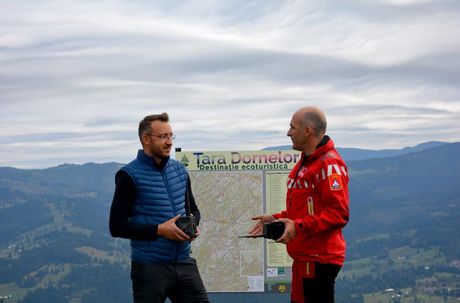Holzindustrie Schweighofer supports mountain rescue actions in Țara Dornelor
Back in 1985, in Vatra Dornei, a group of mountain lovers established the Gențiana mountain club. Later on, in 1998, the Vatra Dornei Public Mountain Rescue Service was established, and ever since it functioned as an integrated service within the City Hall. As first responders, Vatra Dornei Mountain Rescue operate on the mountains in Țara Dornelor: Suhard, Giumalău, Călimani and the Bistriței Mountains, with a team of 12 people, both employees and volunteers, of which 8 are certified.
“In our everyday activity we rely on passionate volunteers, who respect the mountain and the people; our biggest desire in this respect is to enjoy the nature and the chance of having been born or of having lived in Țara Dornelor,” says Petru Ariciuc, head of the Vatra Dornei Mountain Rescue. Apart from this, the Vatra Dornei Mountain Rescue is also in charge with managing the Veverița ski slope in Vatra Dornei, with preparing the accessible mountain trails for the winter season – as some of the trails are open all year-around – and with running the tourist formation and promotion centre in the city.
“We have 420 km of mountain trails over here and over 200 km of cycle tourism, all of which are monitored through GPS,” continues Ariciuc. “However, the biggest area of interest is the Călimani National Park, which stretches over 4 counties, covering 24,000 hectares and having several entry points and a very heavy tourist traffic. These protected areas become vulnerable in front of law-defying individuals, who force their entry into the park with different types of motor vehicles, in front of game poachers or in front of those who do not respect nature and leave mountains of garbage behind.”
The Vatra Dornei Mountain Rescue Association has recently received a sponsorship from Holzindustrie Schweighofer, consisting of monitoring video cameras, which are to be set up across the park, as well as in the Giumalău massif and on the Bârnărel Peak, serving several purposes.
“This sponsorship is a big help for those running the park, as it is a very accessible area, with an intense traffic and very many more or less pleasant events. Monitoring the flux of tourists will ensure their security and protection, on one hand, and will help us keep count and produce studies with regards to the circulation and the profiles of the tourists in the area,” adds the head of the Mountain Rescue Service.
“We will also be able to monitor the fauna and, depending on the season, we can move these cameras to capture the most original scenes in the lives of mountain roosters, of bears or stags, for example. And such images will be made available to the public, so that more people can enjoy the spectacle offered by nature.”
Some of the cameras will be installed in higher areas where, according to Ariciuc, they will be useful to survey the areas prone to fires.
Vasile Varvaroi, the Holzindustrie Schweighofer project coordinator says:
“We, the team of Holzindustrie Schweighofer, do everything in our power to make sure these natural habitats are protected both now and on the long term. This is one of the reasons for which Holzindustrie Schweighofer voluntarily committed not to source wood from buffer zones of national parks, even if harvesting is allowed by law in these areas.”
Moreover, “this year we contributed, though the Tomorrow’s Forest project, to a large volunteer action, which involved almost 600 nature lovers who planted spruce, fir and larch seedlings on a two-hectare area in the Călimani National Park. This sponsorship with video cameras shows that Holzindustrie Schweighofer understands the importance of these protected areas, contributing both to their protection, and to the security of their visitors. We are, therefore, close to nature and close to the community.”
